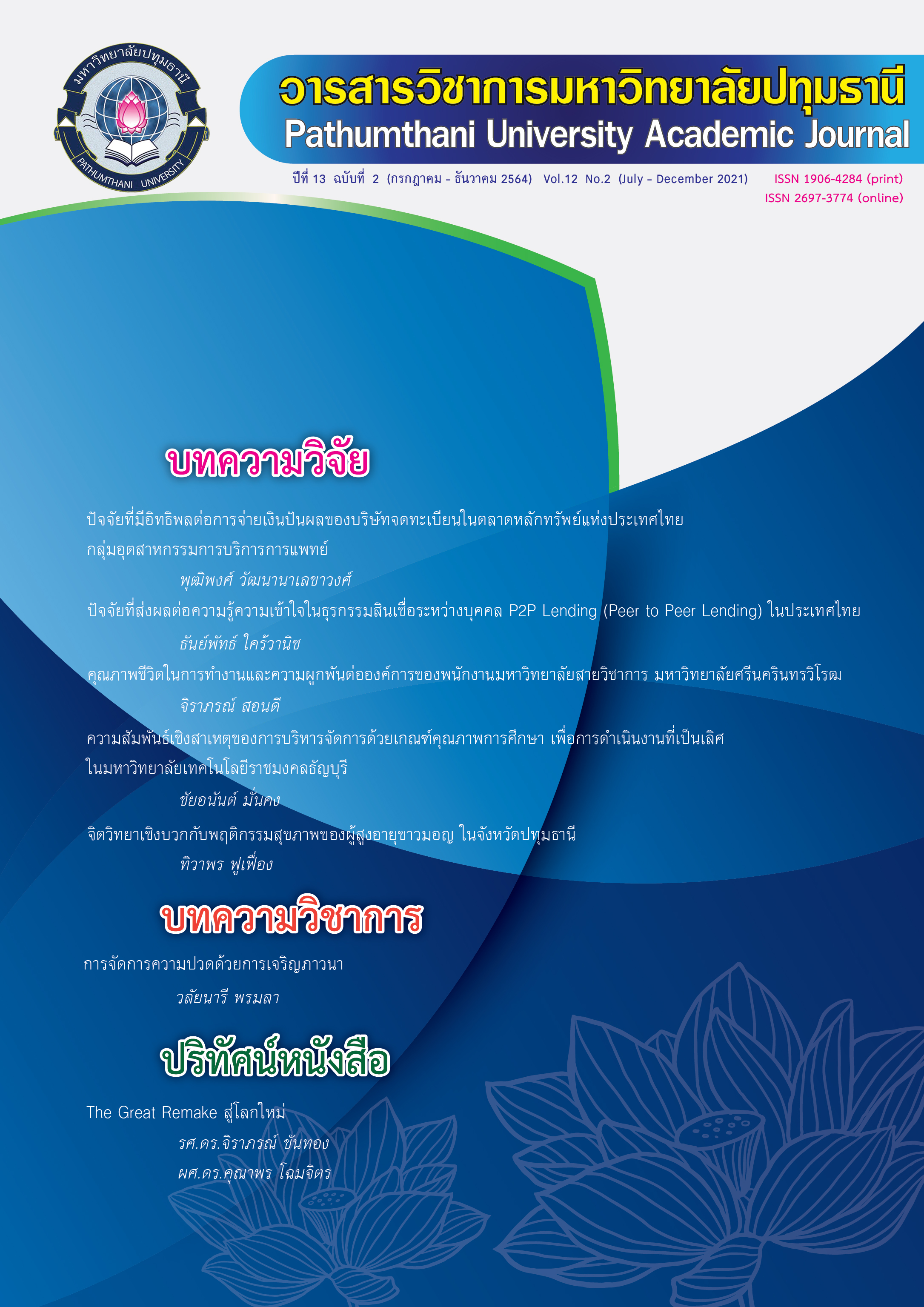THE PRIORITY NEEDS FOR HABITS OF HIGHLY EFFECTIVE PEOPLE OF SUANKULARB WITTAYALAI AFFILIATE SCHOOL TEACHERS
Keywords:
Habits of highly effective people, Teacher Advisor, Suankularb Wittayalai affiliate schoolAbstract
This research was a descriptive research with the objectives to study Approaches for Developing Suankularb Wittayalai Affiliate School Teacher Based on the Concept of Highly Effective People Habits. The population studying were Suankularb Wittayalai Affiliate Schools in 11 schools consisted of 46 administrators, 99 learning substance group leaders, 66 class leaders. Using a specific sample selection and 140 teachers classified by academic standing. Using Taro Yamane's formula, a total of 351 people were used. The research instruments were statistical questionnaires used to analyze data such as arithmetic mean, Standard deviation Analysis and Priority Needs Index.
The research results were as follows: Approaches for Developing Suankularb Wittayalai Affiliate School Teacher Based on the Concept of Highly Effective People Habits, found that Approaches for Developing Suankularb Wittayalai Affiliate School Teacher Based on the Concept of Highly Effective People Habits, having the order of requirements needed from highest to lowest was measurement and evaluation (PNImodified = .193), learning management (PNImodified = .190) and learning management plan (PNImodified = .186). When considered in individually aspect with the highest order of need and lowest sequences, it was the beginning aspect with an objective in mind and the saw aspect to be always sharpened, respectively, and the High Effective Characteristics school counselor of Suankularb Wittayalai Affiliate Schools in order of need from highest to lowest was to take care of the students' behavior (PNImodified = .182). When considered in individually aspect with the highest priority and lowest was to do the important first. And the saw aspect to be always sharpened, respectively. When considered individually aspect with the highest order of need and the lowest, understanding of others. And the winning / winning thinking aspect, Consultation And counseling (PNImodified = .181) when considering individually with the highest need and lowest were to do the important thing first. And the saw aspect to be always sharpened, respectively.
References
กลุ่มโรงเรียนในเครือสวนกุหลาบวิทยาลัย. (2559). ธรรมนูญการศึกษาแห่ง สถาบันสวนกุหลาบ.กรุงเทพมหานคร : โรงเรียนสวนกุหลาบวิทยาลัย. (อัดสำเนา)
ทิพวรรณ ดอนดี. (2552). ผลของโปรแกรมพัฒนาอุปนิสัย 7 ประการของผู้มีประสิทธิผลสูง ที่มีต่อความรู้สึกเห็นคุณค่าในตัวเอง และความฉลาดในการเอาชนะอุปสรรคของนักศึกษาระดับมหาวิทยาลัย. การค้นคว้าอิสระปริญญาวิทยาศาสตรมหาบัณฑิต สาขาวิชาจิตวิทยาการปรึกษา. มหาวิทยาลัยเชียงใหม่.
บุญชู โรจนเสถียร. (2546). เปิดขุมทรัพย์เศรษฐกิจพิชิตความยากจน. รวมคำบรรยายและบทแสดงวิสัยทัศน์. กรุงเทพมหานคร : เนชั่นบุ๊คส์ อินเตอร์เนชั่นแนล.
บริษัท แพคริม ลีดเดอร์ชิป เซ็นเตอร์ จำกัด. (2562). ความท้าทายของนักการศึกษาในยุคศตวรรษที่ 21. สัมมนาเชิงปฏิบัติการ 7อุปนิสัยสำหรับนักการศึกษา. [ออนไลน์]. เข้าถึงได้จาก :https://readgur.com/doc/1976248/ เมื่อวันที่ 6 กุมภาพันธ์ 2564.
พบพร จิตรักษา. (2554). การสร้างแบบวัดอุปนิสัยแห่งความสำเร็จสำหรับนักเรียนชั้นประถมศึกษาปีที่ 6.ปริญญานิพนธ์การศึกษามหาบัณฑิต สาขาวิชาการวัดผลการศึกษา.มหาวิทยาลัยศรีนครินทรวิโรฒ.
โรงเรียนสวนกุหลาบวิทยาลัย (2562). รายงานผลการประเมินตนเอง โรงเรียนสวนกุหลาบวิทยาลัย ปีการศึกษา 2562. [ออนไลน์]. เข้าถึงได้จาก : http://www.sk.ac.th/ เมื่อวันที่ 10 ตุลาคม 2563.
โรงเรียนสวนกุหลาบวิทยาลัยรังสิต. (2561). การเรียนรู้วิชาชีพ PLC การสร้างแผนการจัดการเรียนรู้. ปทุมธานี : โรงเรียนสวนกุหลาบวิทยาลัยรังสิต. (อัดสำเนา)
สถาบันทดสอบทางการศึกษาแห่งชาติ ปีการศึกษา. (2561). ผลคะแนนสอบโอเน็ต (O-NET) ระดับชั้นมัธยมศึกษาปีที่ 6. [ออนไลน์]. เข้าถึงได้จาก : https://www.niets.or.th/th/ เมื่อวันที่ 6 กุมภาพันธ์ 2564.
สุวิมล ว่องวาณิช. (2558). การวิจัยประเมินความต้องการจําเป็น. (พิมพ์ครั้งที่ 3). กรุงเทพมหานคร : วี.พริ้นท์ (1991)
สำนักงานคณะกรรมการพัฒนาเศรษฐกิจและสังคมแห่งชาติ. (2545). แผนพัฒนาเศรษฐกิจและสังคมแห่งชาติ ฉบับที่ 10 (พ.ศ.2550-2554). กรุงเทพมหานคร : โรงพิมพ์คุรุสภาลาดพร้าว.
สำนักงานคณะกรรมการการศึกษาขั้นพื้นฐาน กระทรวงศึกษาธิการ. (2561). ยุทธศาสตร์ที่ 3 ด้านการส่งเสริมพัฒนาครูและบุคลากรทางการศึกษา. โครงการพัฒนาครูรูปแบบครบวงจรของสักนักงานคณะกรรมการการศึกษาขั้นพื้นฐาน ปีงบประมาณ พ.ศ. 2561. [ออนไลน์]. เข้าถึงได้จาก : https://www.obec.go.th/wp-content/ เมื่อวันที่ 12 กุมภาพันธ์ 2564.
อมรวิชช์ นาครทรรพ. (2550). การพัฒนาครูเป็นยุทธศาสตร์แห่งชาติ. ผู้จัดการออนไลน์. [ออนไลน์]. เข้าถึงได้จาก : https://mgronline.com/qol/detail/ เมื่อวันที่ 6 กุมภาพันธ์ 2564.
อัจฉรา พูลเพิ่ม. (2549). การพัฒนาการดำเนินงานตามระบบดูแลช่วยเหลือนักเรียนโรงเรียน กันทรารมณ์ อำเภอกันทรารมณ์ จังหวัดศรีสะเกษ. วิทยานิพนธ์ปริญญาการศึกษามหาบัณฑิต สาขาวิชาการบริหารการศึกษา. มหาวิทยาลัยขอนแก่น.
Covey, Stephen R. (1989). The 7 Habits of Highly Effective People. New York: Simon and Schuster.
______. (2004). The Seven Habits of Highly Effective People. New York: Simon and Schuster.
Yamane Taro. (1973). Statistics: an introductory analysis. (3rd ed.). New York: Harper and Row Publication.
Downloads
Published
How to Cite
Issue
Section
License
บทความที่ได้รับการตีพิมพ์เป็นลิขสิทธิ์ของวารสารมหาวิทยาลัยปทุมธานี
ข้อความที่ปรากฎในบทความแต่ละเรื่อง เป็นความคิดเห็นส่วนตัวของผู้เขียน กองบรรณาธิการไม่จำเป็นต้องเห็นด้วยเสมอไป และไม่มีส่วนรับผิดชอบใด ๆ ถือเป็นความรับผิดชอบของผู้เขียนแต่เพียงผู้เดียว



